10 Ways to Save Money by Going Green, According to Financial Experts

With inflation still making us spend more than we’d like, most of us are looking to cut costs anywhere we can. This likely includes resisting impulse buys at the grocery store or re-wearing last year’s trends, but you can also save money by being more eco-conscious. If you’re looking for ways to develop environmentally friendly habits and significantly reduce your bills, you’ve come to the right place. Read on for 10 ways to save money by going green.
RELATED: 9 Ways to Save Money on Household Essentials, According to Finance Experts.
1
Rethink your commute.

First things first, experts recommend thinking about how you get to and from work. Even if you’re only in the office a few days a week, you can save some major cash by using public transportation, carpooling, riding your bike, or walking, says money-saving expert Andrea Woroch.
“If you drive to work every day by yourself, your vehicle is spitting out pollutants. Costs of gas, vehicle maintenance and repair, and depreciation make it more expensive, too,” adds Sean Fox, president of debt resolution at Achieve.
Switching up to another option—even one day a week—will make a difference, he notes.
“For every gallon of regular gas your vehicle consumes, more than 19 pounds of carbon dioxide (CO2) are emitted into the atmosphere,” Fox points out. “On a 20-mile commute, that’s 11 pounds a day. Eliminate the drive one day per week, and you would save 550 pounds of carbon and about $186 a year in gas.”
2
Adjust your laundry routine.
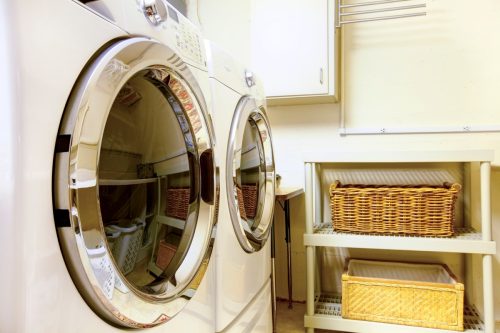
Another way you can save money by going green is by washing your laundry in cold water.
“Most of today’s detergents are designed to work well in cold water—and since washing in cold can save 90 percent of a washing machine’s energy, it might be worth a try,” Fox suggests.
Hang drying on a drying rack or outside on a clothesline may be worth it as well.
“If you switched from running the dryer 200 times a year to hanging clothes to dry, you would save almost half a ton of CO2,” Fox shares.
RELATED: 11 Easy Ways to Save Money on Groceries, Experts Say.
3
Be smart with your appliances.
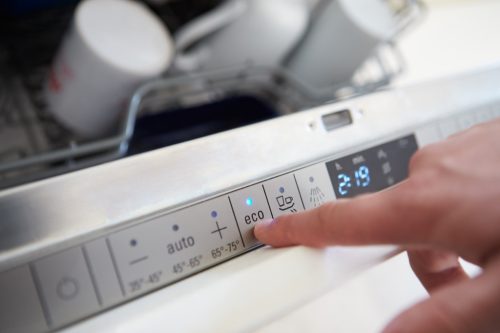
While investing in energy-efficient appliances will require you to spend a bit of money upfront, it can end up saving you that much more in the long run.
“Energy efficient appliances use less energy and cut your energy consumption, thus saving you on your monthly bill,” Woroch says.
You should also unplug any gadgets or appliances when they’re not in use. According to Woroch, plugged-in appliances can continue to use energy even when they’re off.
“[This] can make up about 10 percent of your home energy bill, offering big savings there,” she explains.
4
Change your lightbulbs.

This one won’t break the bank—and chances are your lightbulbs will be in need of a change soon enough. With that in mind, grab LED bulbs the next time you’re at the store.
According to Andrew Latham, certified financial planner (CFP) and managing editor at SuperMoney, LED bulbs use at least 75 percent less energy and last 25 times longer than incandescent bulbs.
“The quality of LED bulbs continues to increase while costs continue to decrease,” Fox adds. “Savings will vary based on energy costs in your area and your home, but some estimates place the savings of installing LED bulbs throughout a home at more than $3,600.”
RELATED: 14 Practical Ways to Save Money Each Month.
5
Always go for reusable options.
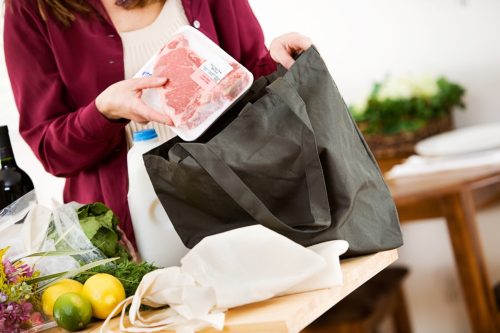
Woroch says that a reusable water bottle is one of the easiest ways to go green and save. So, if you’ve been waiting to buy your own Stanley Cup, you now have a solid reason (as long as you aren’t stockpiling them).
“While you may spend more upfront for a quality water bottle, this will save you in the long run as you stop wasting money on plastic water bottles when you’re running errands or traveling,” Woroch shares. “It helps reduce plastic waste, too!”
This also applies to shopping bags. Even if you live in one of the states that hasn’t banned single-use shopping bags, it’s worth it to bring your own.
“The environmental issue is that the plastic used to make the bags is petroleum, which means their manufacture produces carbon emissions,” Fox explains.
Reusable bags can help you save the pesky 5 cents some stores charge, and avoid putting more plastic bags into the environment. Even better, reusable options are often sturdier and easier to carry, Fox points out.
6
Go paperless.
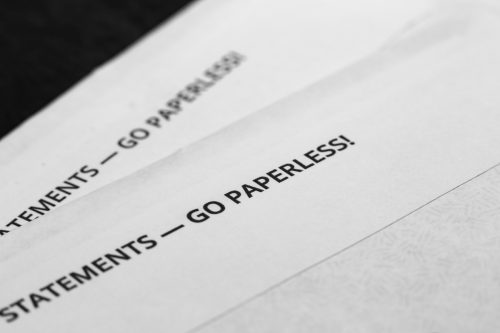
Most companies now offer paperless options, with many also providing financial incentives to encourage you to go electronic.
“Convert all banking and billing statements (for cable, cell phone, utility companies as examples) to electronic statements,” advises Teri Williams, president and chief operating officer of OneUnited Bank. “This change will not only reduce paper and mail delivery, but will also provide you with more convenient access to your financial information.”
When you’re paying bills, it’s also helpful to do so electronically.
“Using bill pay to pay your bills is another way to ‘go green,’ which will reduce your cost for stamps and reduce your use of paper checks,” Williams says.
RELATED: 16 Best Ways to Save Money While Shopping Online, According to Experts.
7
Resist the urge to adjust the thermostat.
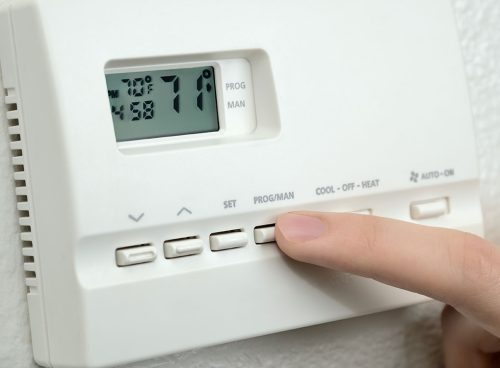
Every suburban dad knows that the thermostat is one of the biggest money-suckers. And they’re not wrong—the numbers speak for themselves.
“In terms of cost savings, the U.S. Department of Energy estimates savings of about 1 percent for each degree of thermostat adjustment over an eight-hour period,” Fox shares. “So, if you turn thermostats back 7 to 10 degrees from normal settings for eight hours per day (e.g., in the winter when you are sleeping), energy savings would amount to 10 percent.”
To make things easier, Fox recommends investing in a manual, programmable thermostat. These won’t break the bank—priced between $25 and $75—and are often easy to install yourself.
8
Consolidate online purchases.

If you are going to be spending some money online shopping, you can reduce waste and save on shipping costs by consolidating.
“Order everything at once if you are buying online and shipping the items to your home,” Fox suggests. “You’ll minimize environmental impacts of shipping and, at many online retailers, save on shipping costs. Reuse boxes and packing materials (or give them to a local mailing shop to reuse).”
RELATED: 10 Ways to Save Money on Childcare, According to Financial Experts.
9
Fix leaks.
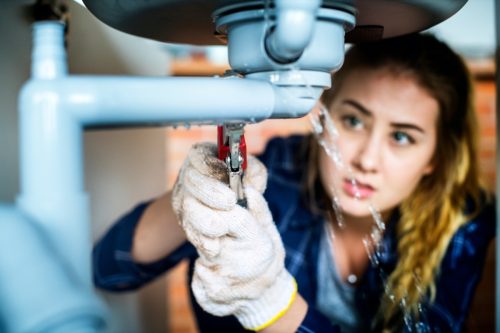
Fixing a pesky leak is not only a relief, but also saves you money and helps the environment.
“A single leaky faucet can waste over 3,000 gallons of water a year,” Latham cautions. “Fixing leaks can save you up to 10 percent on your water bill.”
If you’re handy, you can save money by doing the work yourself, but there’s always the option to hire a professional, too.
10
Make sustainable choices if you’re moving.

This tip is on a grander scale, but Williams says you should definitely consider the environmental factors when buying a new home.
“By avoiding homes in flood zones or with high risk of flooding, you can save on insurance and possibly avoid climate risk,” she says. “Realtor.com does a great job identifying environmental risks for homes, including flood, fire, heat, wind, and air.”
She adds, “Making a sustainable home purchase decision can reduce your environmental risk and save you money on homeowners insurance.”